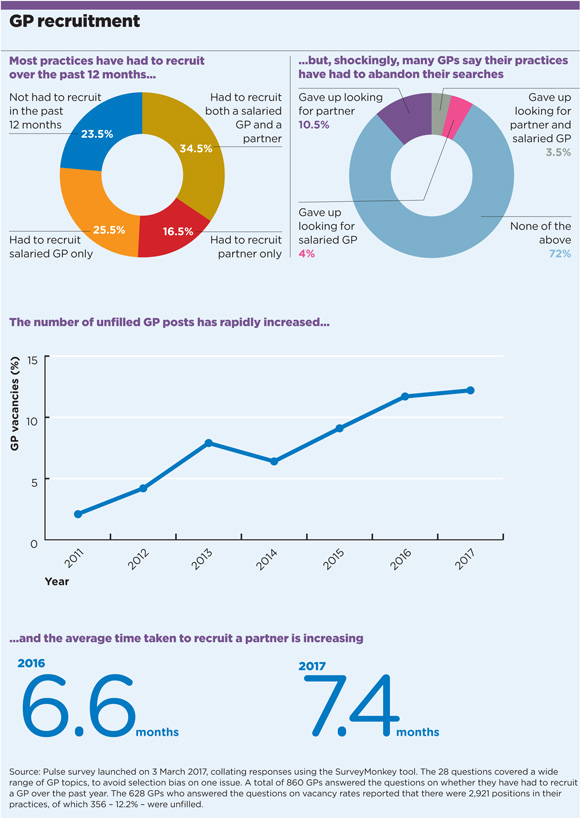Situation vacant: Pulse uncovers ‘staggering’ GP shortfall

Almost one practice in five has had to abandon its search for a new GP as vacancies hit their highest level ever, shocking Pulse survey results reveal.
Pulse’s annual practice vacancies survey was answered by 860 GPs and reveals that 12.2% of all positions are currently vacant – a small increase from the 11.7% reported at the same time last year.
More worryingly, 158 (18%) said they had to give up recruiting a GP in the past 12 months after several unsuccessful attempts. The survey also reveals that the average time taken to recruit a GP partner has lengthened by almost a month over the past year.
GP leaders say staff shortages are heaping pressure on practices, with some resorting to hiring non-GPs to fill gaps.
GPs have also reported having to close down their practices after failing to recruit a partner.

gp recruitment data june 2017 580px
Rapid increase
Pulse has run its vacancy survey since 2012, when the level of positions vacant was 4.2%. It offers the only longitudinal data on the subject; the last official figures were published in 2011 and showed a 2.1% vacancy rate.
The results come as the drive to recruit the 5,000 new GPs promised by the Conservatives goes into reverse. NHS England’s GP Forward View last year attempted to address the GP recruitment crisis through a £500m emergency fund.
However, official figures from NHS Digital suggest the number of full-time-equivalent GPs actually decreased by 542 in the period after the announcement.
Dr Charlotte Ferriday, a GP in Devon, said her practice was forced to close after its sole principal had a heart attack and wanted to come back as a salaried GP.
She said: ‘No one wanted to be a partner at a small practice of 2,800 patients. It is hard work to run a practice and much harder as a sole principal.’
RCGP chair Professor Helen Stokes-Lampard called Pulse’s figures ‘staggering’. She added: ‘In the most severe cases, not being able to recruit
has forced practices to close, and this can be a devastating experience for the patients and staff affected, and for the wider NHS.
‘This must be addressed as a matter of urgency. Progress is being made in recruiting junior doctors into general practice, but overall GP numbers are down on last year, so we need a huge push to retain trained, experienced GPs in the workforce, as well as continuing to step up recruitment efforts, and making it easier to return to practice after a career break or period working abroad.’
An NHS England spokesperson commented: ‘This miniature survey of fewer than one in 10 GP practices is statistically incapable of giving an accurate national picture of GP posts.’
Pulse October survey
Take our July 2025 survey to potentially win £1.000 worth of tokens











